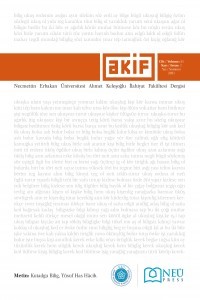Avrupa’da Hümanizmin Arka Plânı ve Erasmus
Ortaçağın skolâstik düşünce ve dini baskısından kurtulma sancılarını yaşayan Avrupa, XV. Yüzyıldan itibaren üç yeni düşünce akımı ile karşı karşıya gelmiştir. Bunlar, sırasıyla, Rönesans-Reform ve Hümanizmdir. Rönesans’ın merkezi olan Floransa’nın üzerinde bugüne kadar çok durulmamıştır. Hâlbuki Rönesans’ın ateşleme fitili önce, Floransa’da yanmaya başlamıştır. Bu ateşlemenin gerçek sahipleri, Cosme De Medicis (+ 1464) ile Lorent Medicis (+ 1492) olmuştur. Medicis ailesi, Eflatuncu felsefenin hayranları olarak, Pléthon’a (+ 1450) destek vermişler ve Pléthon, onların sarayında, Eflatuncu bir akademi kurmuştur. Bu akademide, Marcile Ficin (+ 1499) çok önemli bir yer işgal etmektedir. Ficin, Ploton’dan ve Plotin’den seçilen Yunanca metinleri, Latinceye çeviriyordu. İşte bu akademinin yayımladığı HERMETİK METİNLER, o dönemin Avrupa’sında en eski vahiyler olarak kabul edilerek, Batı aydınlarının düşüncesinde âdeta yeni ufuklar açmıştır. Corpus Hermeticum adı verilen bu metinlerin, Hz. Musa’dan da önceki bir vahiyi temsil ettiğine iyice inanılmıştı. Bu durum, XV. Yüzyıl Avrupa’sının içinde bulunduğu yeni bir durumdu. Bu dönemin aydınları, Platon’a, Mısır ve İran dinlerinin sırlarına dayanan en eski bir vahye duydukları özlemle birlikte, ortaçağ Hıristiyan ilâhiyatının da mirası olan derin bir tatminsizliği de açıklıyordu. Böylece, iki asra yakın bir zaman, HERMETİSME, inançlı olduğu kadar, inançsız, gizli ateist olan birçok ilâhiyatçı ve filozofu etkilemiştir. En eski bir vahiy olarak kabul edilen, Corpus Hermeticum, Yunan bilgin, İsaac Casaubon (+1514)nun, filolojik temellere dayanarak, çok eski bir vahiy değil, çağımızdan iki veya üç asır öncesine kadar bile gitmeyen Helenistik Hıristiyan Senkretizmini yansıtan bir metin olduğunu ispat edince, Avrupalı aydınlar, şaşkına dönmüşlerdi.
THE BACKGROUND OF HUMANISM IN EUROPE AND ERASMUS
Europe, which was in the process of shifting away from the scholastic thought and religious oppression of the Middle Ages, was confronted with three new movements of thought from the fifteenth century onwards. These were, respectively, the Renaissance, the Reformation and Humanism. Florence, the centre of the Renaissance, has not been focused on significantly until today. However, the fuse of the Renaissance was first lit in Florence. The ones who ignated it were COSME DE MEDICIS (+ 1464) and Lorent Medicis (+ 1492). The Medici family, admirers of Platonic philosophy, supported Pléthon (+ 1450) who founded a Platonic academy at their palace. In this academy, Marcile Ficin (+ 1499) occupied a very important place. Ficin translated select Greek texts from Ploton and Plotin into Latin. The HERMETIC TEXTS published by this academy were accepted as the oldest revelations in the Europe of that period and opened new horizons in the thought of Western intellectuals. It was firmly believed that these texts, called CORPUS HERMETICUM, represented a revelation even before Moses. This was a new situation in Europe in the fifteenth century. The intellectuals of this period, with their longing for Plato and for an ancient revelation based on the secrets of the Egyptian and Persian religions, expressed a deep dissatisfaction (with the current state of theology), which was also the legacy of medieval Christian theology. Thus, for nearly two centuries, HERMETISM influenced many theologians and philosophers, both believers and non-believers, i.e. those who were secretly atheists. European intellectuals were astonished when the Greek scholar Isaac CASAUBON (+ 1514) proved on philological grounds that the Corpus Hermeticum, considered to be the oldest revelation, was not an ancient revelation, but a text reflecting the HELENISTIC CHRISTIAN SYNCHRETISM, which did not go back even two or three centuries before our era.
___
- Aydın, Mehmet. “Luther’in Doksan Beş Maddelik Tezine Hermenötik Bir Yaklaşım”. Türk-İslâm Medeniyeti Akademik Araştırmalar Dergisi 14/27 (2019), 9-22.
- Baudrillart, Alfred. L’Eglise Cath la Renaisseance, le Protestantisme. Paris: Librairie Bloud, 1908.
- Bremond, Henri. “L’Humanisme dévot”. Histoire Littéraire du sentiment religieux en France, depuis la fin des guerres de religion jusqu’a nos jours 1 (2018).
- Cayré, Fulbert. Précis de Patrologie. Paris: Desclee, 1930.
- Champomier, J. “Naissance de l’humanisme chrétien (Saint Justin, Origène, Clément d’Alexandrie)”. Bulletin de l’Association Guillaume Budé Année 3 (1947), 58-95.
- Domenach, Jean-Marie. “Erasmus”. Encyclopaedia Universalis. ed. Encyclopaedia Universalis. Paris, 1982.
- Dvornik, Francis. Konsiller Tarihi. çev. Mehmet Aydın. Ankara: Türk Tarih Kurumu, 2019.
- Eliade, Mircea. Dinin Anlamı ve Sosyal Fonksiyonu. çev. Mehmet Aydın. İstanbul: Kabalcı Yayınevi, 2015.
- Gallez, Jean-Pol. “L’ Humanisme Evangelique Chrétien”. Laval Theologique 70 (2014), 119-141.
- Guiraud, Jean. Eglise et les Origines de la Renassance. Paris: Nabu Press, 2012.
- Lacoste, J. Y. Histoire de la théologie. Paris: Broché, 2009.
- Massaut, J. P. Critique et Tradition à la veille doctrinal de la reform en France. Paris: J. Vrin, 1974.
- Moingt, J. Dieu qui Vient á l’homme. Paris: Desclee, 2002.
- Wulf, M. De. hist de la Phil Med. Paris: Kessinger, 1905.
